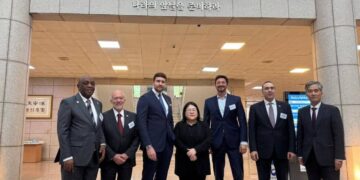Senate President of the Federal Republic of Nigeria, Senator Godswill Akpabio on Sunday arrived Luanda, Angola for the 147th IPU Assembly as the Leader of Nigeria’s delegation.
Senator Akpabio who was accompanied by four Senators and five members of the House of Representatives was received on arrival at the Luanda International Airport by the Nigerian Ambassador to Angola H.E. Professor Monique Oshame Ekpong and top officials of the Angolan government led by Joao Diogo Gaspar, Deputy Secretary UIP Angola.
A statement by the Special Assistant (Media/Communication) to the Senate President, Anietie Ekong quoted Mr Gaspar as saying that Angola was honoured by the presence of the Nigerian President of the Senate.
Mr Gaspar noted that Akpabio’s attendance at the IPU Assembly with the Nigerian delegation would foster good relations not only between Nigeria and Angola but among African countries to reach consensus on issues affecting the continent.
Senator Akpabio said he was delighted to attend the IPU Assembly hosted by Angola and commended the Angolan Government for a good bilateral relations with Nigeria.
According to Senator Akpabio, “it would have been a disservice to Africa if Nigeria did not have a strong delegation at the IPU. Our presence here is to ensure that our bilateral relationship is strengthened. With our presence we can forge a strong bilateral parliamentary relationship for the interest of our nations,” he said.
On arrival Senator Akpabio led Nigeria’s delegation to the first meeting of The African Group at the IPU Assembly.
The 147th IPU Assembly is holding in Luanda, Angola, from 21 to 27 October 2023, hosted by the National Assembly of Angola. The IPU Assembly will provide a platform for parliamentarians, partner organizations and experts to share good practice and commit to the overall theme of Parliamentary action for peace, justice and strong institutions.
The theme is closely linked to United Nations Sustainable Development Goal 16: Peace, justice and strong institutions, a key enabler of the entire development agenda.
The Assembly will consider actions to strengthen trust between people and governance structures, to make public institutions more effective, accountable and representative, and to better equip parliaments to address the multiple interconnected geopolitical, economic and environmental crises facing the world.














